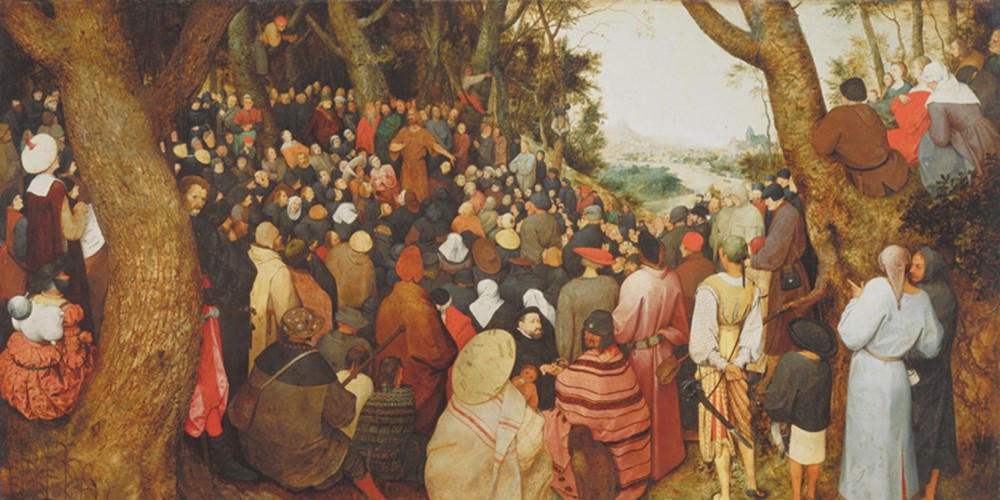A Covenantal Politics
Two magisterial Protestant traditions took shape in the sixteenth century: Lutheran and Reformed. Whereas Lutherans took more of a Cuius regio, eius religio [“whose realm, his religion”] approach, deferring to the magistrate on religious matters, the Reformed did not. In resisting Catholic rulers or establishing new Protestant ones, Reformed theologians took up important political questions including the power of the magistrate (in warfare or law, for example), the responsibilities of the Christian citizen, and what is now called “church-state relations.” Robust humanist learning and theological inquiry combined in a fiery furnace of persecution to forge rich political theory influencing the continent and Great Britain and foundational in the American colonies—both Anglican and Puritan. It is hard to imagine church-state relations in the colonies, or the religious fervor of the War for Independence, apart from Reformed Protestantism.
Given the influence of Reformed political theology over at least three centuries, it is scandalous that most political theorists, especially those trained in American graduate programs, know relatively nothing about it. Nor, apparently, will their students: the Open Syllabus Project demonstrates how ancient and secular modern authors greatly outnumber Protestant sources, and surveys of political thought typically ignore both scripture and theology. Even a premier Jewish intellectual like Leo Strauss could not give scripture its due in articulating the development of Western politics. “Cambridge school” scholars pay attention to Protestantism only as a museum piece. Political theorists are also fond of telling a narrative of “secularization” pushing revelation to the fringes of serious political thought, except perhaps as a waystation to enlightenment.
What’s a political theorist to do? Enter David Henreckson’s The Immortal Commonwealth: Covenant, Community, and Political Resistance in Early Reformed Thought. Henreckson’s book is not the first holistic treatment integrating Reformed (covenant) theology and political thought, though he suggests that it is. Nevertheless, given the paucity of books on Reformed political theology, the honor is not reserved to the first or most recent, but to any book that can help rescue an entire subfield of political science from its own ignorance. Henreckson not only summarizes essential ingredients of Reformed Protestant political theory, he engages and refutes much of what has claimed to marginalize it.
The Character of God
Henreckson prudently focuses on the period between 1574 and 1614. The St. Bartholomew Day Massacre of 1572 launched important political works by Theodore Beza (Calvin’s successor in Geneva) and Philippe de Mornay; Johannes Althusius published the final edition of his Politica in 1614, a high water mark for Calvinism before the apocalypse of the Thirty Years War. In situating the project, Henreckson identifies interpretive strains with which he disagrees. Though he loses track of these initial categories and never circles back to refute some of them, he does convincingly show that Reformed theology did not advance a voluntarist theology of a tyrannical, arbitrary, or severe God. Henreckson also demonstrates that Reformed political thought was neither secularist nor overcome by secularism. Theology remained central to its project.
Concerning the charge of a voluntarist God in Reformed theology, Henreckson replies with example after example demonstrating that Reformed theologians were deeply concerned with demonstrating the character of God to be neither capricious nor tyrannical, but rather merciful and obliged by His loving character. After all, God condescends to covenant with sinful persons and makes promises to them. Though Henreckson has relatively little to say about Calvin, he notes that Calvin condemned absolutist depictions of God and laid the blame for them on the scholastics of the Sorbonne.
God’s willingness to covenant, and his faithfulness to His covenant, were central to Reformed theology and anthropology. Henreckson’s main argument begins by tracing the development of the covenant device—the idea of a salvific agreement made by God with persons—mainly as a theological idea, from Zurich through the Palatinate from 1520 through 1585. He agrees with the more recent scholarship of David Steinmetz or Richard Muller, for example, that the development of covenant theology among the Reformed was not discontinuous with medieval precedents or Protestantism more generally. (Luther used it, for example.) Terms such as pactum, promissio, testamentum, and foedus were used widely in Western discourse concerning both God and politics before the Reformation. And though late medieval voluntarist theologians used these terms, there is no evidence that voluntarist theology influenced Reformed theology.
Henreckson demonstrates how covenant theology relied on both a divinely created order and natural law. This integration of reason and revelation is important to contend against those who insist on separating the two, as well as against those pushing the “secularization” narrative in early modern political thought. Henreckson also marshals many examples to challenge the disciplinarian thesis of Calvinism as social control or state power and instead demonstrates how Reformed theologians emphasized human flourishing (inhibited by expansive civil power) as the telos of moral order. Jerome Zanchi, composed a “Protestant Summa,” for example. Both Matthias Martinius and Johann Heinrich Alsted (contemporaries of Althusius) had very high views of politics. Alsted said, for example, “The republic is an example and image of eternal life” an idea that Henreckson calls “a prism of early covenantal thought.” Though paralleling the political kingdom and the eschatological kingdom would not encourage liberal toleration (except perhaps as prudence dictated) the parallel did emphasize how God placed a high value on political goods.
The March of Secularism?
Contra the popular “secularization” thesis, Henreckson confronts the assertion that theology was not ultimately essential to Protestant political argumentation, even among the Calvinists thinkers themselves. He begins by describing the circumstances under which Reformed political theology began to mature: the massacre of French Protestants, resistance to Catholic rulers in the Netherlands, and fears of a widespread Catholic plot to exterminate Protestants. The overlap of jurisprudence and theology is essential here insofar as both law and religion pervaded the political imagination.
Violating the rule of law breaks faith with God and the people; God is the divine source of law in both scripture and reason, and the ruler’s political agency is granted only conditionally on these terms.
The remaining chapters in the book elucidate major works of Reformed political theology on the continent, beginning with Beza’s De jure magistratum (1573). Beza argued that because God directs us toward norms of justice that reflect his own good and just nature, we are forbidden to obey impious or irreligious commands directly disobeying God. Political obedience is not unconditional, and disobedience is obliged against commands contrary to piety or charity. As to Beza’s use of natural law, Henreckson disagrees with both John Witte and David van Drunen that it provides a freestanding inventory of rights or moral norms. Rather, natural law emphasizes justice and equity which are institutionalized with prudence and according to particular circumstance. In short, natural law is practical wisdom. Tyranny is illegitimate not because of its violation of consent, but by its violation of natural law and reason—both of which communicate God’s character and intended outcome for politics. Natural law was, for example, significant in political documents published during the Dutch revolt, and scripture was hardly peripheral to the essential arguments (as Martin Van Gelderen or John Coffey insist). The good character of God and his divine authority forbid human tyranny, and God’s character and authority are both reflected in the natural law insofar as it encourages bonds of love and fidelity for the common good of God’s people.
Phillipe de Mornay’s Vindiciae Contra Tyrannos (1579) is perhaps the most well-known of the documents Henreckson examines, and has been cited by Quentin Skinner and van Gelderen, among others, as evincing a move toward essentially secular political thought or, worse, incoherent endorsement of both “theocracy” and popular consent. The solution, Henreckson argues, is found in Mornay’s two-part covenant. The first is between the king, the ruler, and God’s people (the “theocratic” element), and the second is between the king and God’s people (consent). Violating the rule of law breaks faith with God and the people; God is the divine source of law in both scripture and reason (the latter called by many Reformed authors a “particle of divine breath”), and the ruler’s political agency is granted only conditionally on these terms. The people are likewise given political agency both to maintain their faithfulness to God and to pursue the common good under a godly ruler.
Althusius’s Politica, Henreckson’s last title for consideration, is another example of a prominent work whose theological qualities have been dismissed or misunderstood. Because Henreckson has elaborated on the preceding political theology, he can persuasively demonstrate the reliance of Althusius’s consociationalist polity and rights on theology. Consociationalism is not just political fellowship—it reflects God’s fellowship with God’s people also reflected in the two-part covenant. The same is true for Althusius’s conception of just versus unjust laws. Alongside Althusius’s theological foundation is his use of traditional Aristotelian, Thomistic, and Ciceronian political teleology, demonstrating how classical and theological sources were hardly an “either/or.” Likewise, Henreckson demonstrates that Althusius is not an advocate of consent as such, but of a polity in which the people (through their representatives) are stewards of the natural or common law implanted by God. If not for such instruction by God, the people could consent to tyranny, something Althusius condemns.
Will and Resistance
Against these Reformed Protestant works, Henreckson devotes a chapter to rival conceptions of theological and regal voluntarism that asserted the ruler to be accountable only to God and thereby having a will constituting the final normative standard. Whereas Reformed thinkers had posited an immortal commonwealth safeguarded by God and the people’s representatives, absolutists considered only monarchical rule to be perpetual. Political power was efficiently caused by God alone without the people, and therefore accountable to no popular intermediaries.
To impose either legal or covenantal obligations on the king, William Barclay asserted, was to tempt impiety and blasphemy. It bound God to fallible human discernment of royal sins and to the whims of human intermediaries. (Hugo Grotius and others worried that the logical conclusion of the monarchomachs—who rejected monarchy and justified tyrannicide—was democracy). Barclay did not insist that the king could not sin, or command unjustly, only that the people could not deploy a three-part covenant guaranteeing common surety. The king is obligated to God alone. The people are obligated to God and to the ruler as God’s appointed political paterfamilias.
Henreckson concludes with a chapter that promises to not only flesh out more of the Reformed resistance theory but draw contemporary applications. He emphasizes virtues and vices, a discussion salutary but disappointing. While it is true that Protestants, as humanists, liked virtue ethics as much as anyone, how are civic virtues and vices necessarily enhanced, or enabled, by covenant theology? He then turns to the “who, what, when, where, and why” elements of resistance. This section is terse, and leaves too many questions. There are no longer dukes or ephors, so are mayors, sheriffs, or governors, for example, the new “authorized representatives” empowered to defend people against tyranny? Also, Henreckson seems to confirm Grotius’s fear that giving the people accountability (and in the covenantal tradition, before God) means enlarging democracy—which then necessitates the enlarging of virtue among more than a ruling class. Who maintains virtue, even accountability, in our post-liberal moment—or even under liberalism?
Though some of his promised lines of argument get dropped along the way, Henreckson has provided a fine chronicle with valuable insight. He admirably avoids the tedium often found in summaries of historical works, and he demonstrates the significance of Protestantism for political thought. Unfortunately, Henreckson overlooked the chance to exploit this post-liberal moment and ask if a politics of agency, accountability, and flourishing can rely on philosophy alone. His final section promising to address “late modern problems,” chooses the trendy over the transcendent. He asks, “Is there still life in these traditional, white, European, Calvinist bones?” Really? If this has become evaluative criteria for a seminal tradition, perhaps the Cambridge school gets the last laugh after all.



